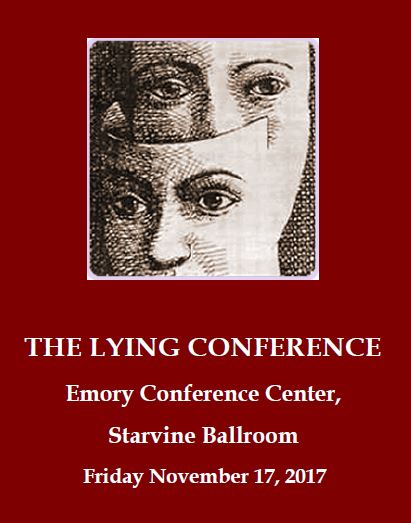The Lying Conference
Philippe Rochat PhD – Conference Organizer
Kate Coblin and Natalie Eldred – Conference Coordinators

What is The Lying Conference?
The Lying Conference was a one-day workshop, where we brought together prominent thinkers and researchers in the social sciences, arts and entertainment to discuss the concepts of lying and deception from evolutionary, developmental, clinical, economics, political, philosophical, and theatrical and entertainment points of view.
Frans de Waal
Psychology, Emory University & Yerkes Primate Center
Perspective-taking and Dishonest Communication in Primates and Other Animals
The study of Theory-of-Mind (ToM) began with ape research by Emil Menzel and later David Premack after which it expanded in developmental psychology, which made it a key measure of social intelligence. Recently, ToM research returned with a vengeance to the apes when a False Belief task was finally conducted. The apes seemed to pass, which adds evidence that apes and a few other nonhuman animals can take the perspective of others. One of the expressions of this capacity is tactical deception, which is clearly more developed in apes than most other species, although there is also evidence for corvids. There is plenty of functional deception in animals (e.g. mimicry), but tactical deception is more flexible and based on learning and anticipation of the reactions of others. It may require enhanced perspective-taking and self-other distinction. I will review the evidence for this capacity in the primates based on both experimental studies and anecdotal information.
Bradd Shore
Anthropology, Emory University
Lying, American Style
Even for the most ardent empiricist, there can be no objective definition of lying. Like many of our familiar ideas, lying can only make sense as “a cultural model” rather than as a simple objective phenomenon. In this talk, I will try to illuminate some of the presuppositions that underwrite the American cultural model, and to suggest some of the ways in which this model has been politically deployed and manipulated in recent decades.
Kang Lee
Developmental Psychology, University of Toronto
Little liars: How children learn to tell lies?
In this talk, I will use scientific evidence from my lab and others over the last two decades to show that lying begins early in life and discuss what factors contribute or do not contribute to the development of lying, why children lie, and whether we adults can easily detect children’s lies. Furthermore, I will discuss recent developments in technology that may help us detect children’s lies and such technology’s applications in lie-detection and beyond.
Alexander Todorov
Psychology & Neuroscience, Princeton University
Face Value: The Irresistible (and misleading) Influence of First Impressions
Physiognomy – the pseudoscience of reading character from faces – has long been discredited, but we are all naïve physiognomists. People form instantaneous impressions from faces, agree on these impressions, and act on these impressions. In the last 10 years, we have introduced data-driven computational methods that allow us to visualize the configurations of face features leading to specific impressions such as trustworthiness. That is, we are able to visualize appearance stereotypes. But are these stereotypes accurate? In the last decade, there has been a resurgence of studies claiming that the stereotypes are indeed accurate. But a closer look at the modern studies shows that the claims of the new physiognomy are almost as exaggerated as those of the old physiognomy. First, different images of the same person can lead to completely different impressions. Second, often our decisions are more accurate if we completely ignore face information and rely on common knowledge. So why do we form first impressions? In our quest to know others and in the absence of good information, we are forced to rely on appearance information. This information could be useful as a guide to the intentions and actions of the person in the immediate here and now, but it is misleading as a guide to the person’s character.
Jonathan Mann
Journalist and CNN anchor, International Desk
What Happened to The News? – Technology, Politics, and the Vanishing Truth
Many Americans believe that the news media intentionally lie to them. President Donald Trump is the best-known detractor of “fake news,” though he himself has been accused of lying more than any other public figure in recent memory. Former CNN anchor Jonathan Mann will address the overlapping changes to technology, politics and business that have crippled our national conversation with deception and distrust.
Tim McDonough
Theatre Studies, Emory University. Resident Artist, Theatre Emory
Onions and Identities: Theater and the True Self
The conflict between truth and deceit, reality and appearance, being and seeming is a theme to which theater is perfectly suited, because theater is deception in service of truth. Drama is densely populated by duplicitous schemers, by power figures whose lies maintain the sociopolitical status quo, and by characters in search of themselves, who mirror to us our confusions and self-deceptions about self. Theater provides a template for understanding identity and insight into several existentially and socially necessary forms of deceit. Excerpts from Hamlet, King Lear, Peer Gynt, Angels in America, and several other plays.
Alex Stone
Professional Magician, writer & entertainer, New York City
The Science of Magic and the Art of Deception
“Magic takes place not in the hands of the magician but in the mind of the spectator.” —magician’s adage Magic is dramatized deception, lying as performance art, cons as theatre. Magicians trick our brains into seeing what isn’t real, and for whatever reason our brains let them get away with it. Turns out, you can learn a lot about how the mind works—and why it sometimes doesn’t—by looking at how magicians distort our perception. Through a mix of psychology, storytelling, and sleight-of-hand, Stone explores the cognitive underpinnings of misdirection, illusion, scams, and secrecy, pulling back the curtain on the many curious and powerful ways our brains deceive us—not just when we’re watching a magician stage his swindles, but throughout our everyday lives.
Sponsors:
Emory Conference Center Hotel Subvention Fund
The Hightower Fund
Emory College Department of Psychology
Center for Mind, Brain, and Culture
Emory University Center for Ethics
Emory Cognition Project
